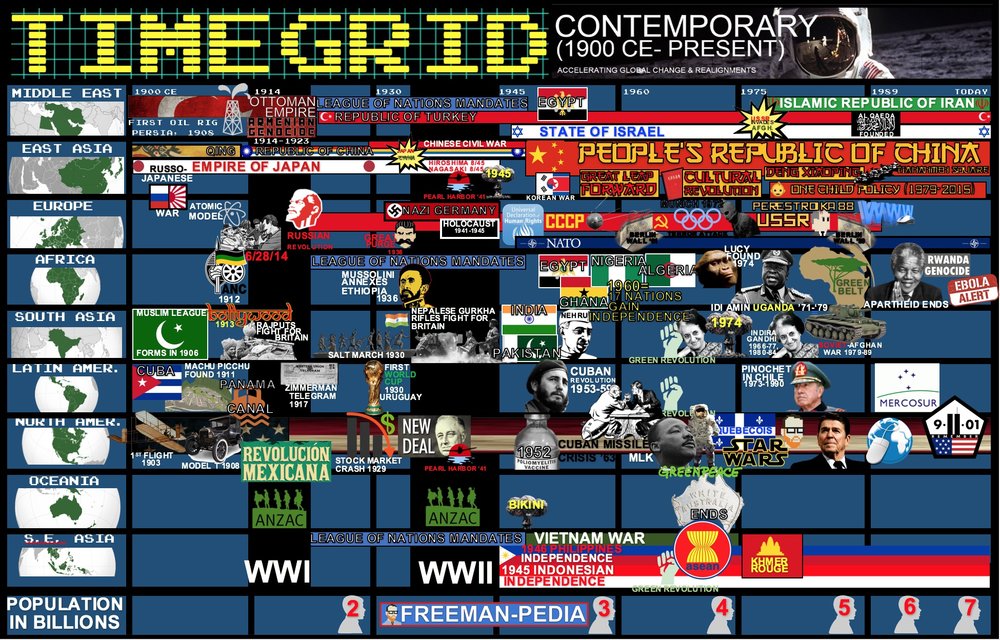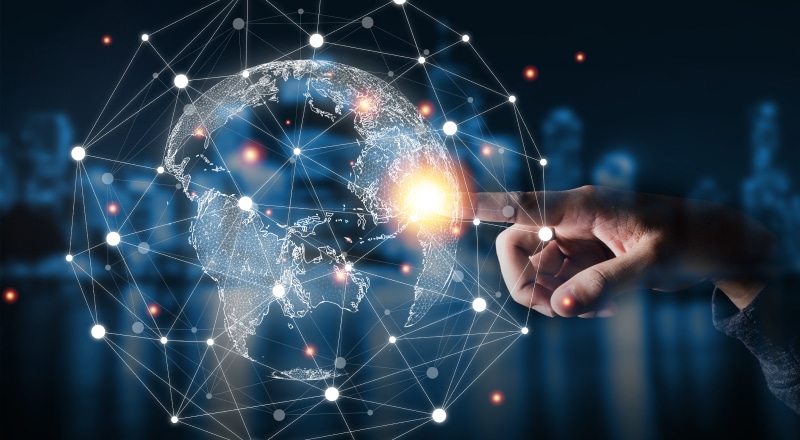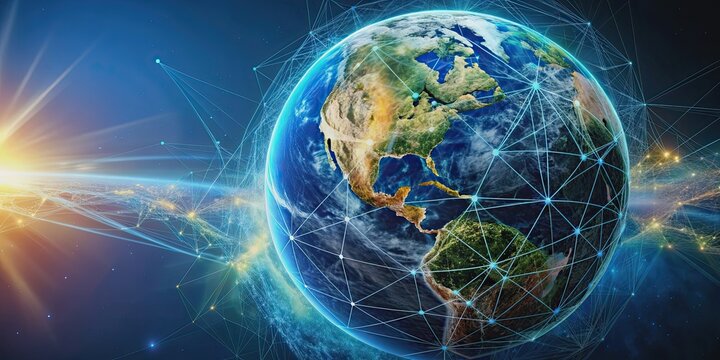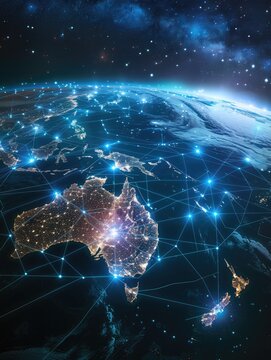Unit 9 Overview: Globalization
Exploring Globalization in AP World History
Welcome to Unit 9, the final unit of AP World History Modern! This unit is a culmination of everything we’ve learned, spanning the time period from 1900 to the present day. While Units 7 and 8 focused on global wars and decolonization, Unit 9 delves into the intricate topic of globalization, exploring why the world functions as it does today.
Globalization, a key theme in this unit, refers to the interconnectedness of economies, cultures, and political systems worldwide. The exam places significant importance on this topic, as it accounts for approximately 8-10% of the multiple-choice section and is likely featured in the short-answer question (SAQ) portion.
This blog aims to provide an in-depth analysis of globalization, touching on its historical roots, key events, and multifaceted impacts, ensuring you’re well-prepared for the exam. With a focus on the six big ideas represented by the SPICE-T acronym (Social, Political, Interaction with the Environment, Cultural, Economic, and Technology), this comprehensive guide is your go-to resource for understanding globalization.

What is Globalization?
At its core, globalization is the spread of ideas, goods, and practices across the world, facilitated by advancements in technology, transportation, and communication. This process has transformed the global landscape, leading to increased interdependence among nations. The effects of globalization have been both profound and multifaceted, influencing every aspect of human life—from culture to the environment, politics, and beyond.
To truly grasp globalization, one must understand its historical precedents. Early examples, such as the Columbian Exchange, illustrate the exchange of plants, animals, and diseases between the Americas and the Old World. This phenomenon reshaped ecosystems and cultures while exposing indigenous populations to new diseases, resulting in significant demographic shifts. Fast-forward to the 20th century, globalization evolved, driven by the spread of capitalism and democracy, particularly during the Cold War era.
While globalization has opened doors to economic growth and cultural exchange, it has also exacerbated economic inequality and displacement for some populations. Understanding this duality is crucial for contextualizing globalization in modern history.
Major Events Shaping Globalization
Globalization has been shaped by pivotal events and technological advancements, as outlined below:
1918-1919: Spanish Flu Pandemic
The Spanish Flu infected one-fifth of the global population, killing more people than the Bubonic plague. This pandemic highlighted the interconnected nature of human societies and underscored the challenges of managing global health crises.
1928: Discovery of Penicillin
Alexander Fleming’s discovery of penicillin marked the dawn of antibiotics, revolutionizing medicine and extending human lifespans. This innovation is a testament to the global exchange of scientific knowledge.
1948: Universal Declaration of Human Rights
Adopted by the United Nations, this declaration laid the groundwork for global human rights standards, emphasizing the interconnectedness of political and social justice worldwide.
1950s: The Green Revolution
The Green Revolution introduced advanced agricultural techniques and high-yield crops, significantly boosting global food production. However, it also raised concerns about environmental sustainability and economic disparity.
1971: Founding of Greenpeace
The establishment of Greenpeace signaled a growing awareness of global environmental issues. This organization has been pivotal in advocating for sustainable practices and combating ecological degradation.
1995: Formation of the World Trade Organization (WTO)
The WTO’s creation marked a significant milestone in economic globalization, fostering international trade and reducing barriers to commerce.
2001: 9/11 Attacks
The terrorist attacks on New York and Washington, D.C., reshaped global politics, leading to the War on Terror and heightened security measures worldwide.
2010s: Arab Spring
A series of revolutionary uprisings in North Africa demonstrated the power of globalization in spreading political ideas and mobilizing communities through digital platforms.
The SPICE-T Framework and Globalization
Globalization can be analyzed through the SPICE-T framework:
Social
Globalization has facilitated the spread of ideas and cultural practices, enriching societies while sometimes leading to cultural homogenization. Movements like the Green Belt Movement reflect the power of collective action in addressing global challenges such as deforestation.
Political
From the Cold War to the formation of the WTO, globalization has influenced political ideologies and international relations. The adoption of the Universal Declaration of Human Rights underscores the global commitment to justice and equity.
Interaction with the Environment
Globalization has had a profound impact on the environment, from the deforestation addressed by the Green Belt Movement to the international efforts to reduce carbon emissions through agreements like the Kyoto Protocol.
Cultural
The exchange of cultural practices and ideas is a hallmark of globalization. While this has fostered greater understanding and diversity, it has also raised concerns about the loss of cultural identity.
Economic
The global economy has been transformed by globalization, with organizations like the WTO playing a central role. However, economic interdependence has also highlighted disparities and vulnerabilities.
Technology
Technological advancements have been the driving force behind globalization. Innovations in communication and transportation have made it easier to connect people and ideas across the globe.
Learning Objectives for Globalization
By the end of this unit, you should be able to:
Explain how technological advancements from 1900 to the present have reshaped the world.
Analyze the environmental, economic, and cultural effects of globalization using the SPICE-T framework.
Compare and contrast historical examples of globalization to understand its continuity and change over time.
The Dual Nature of Globalization
Globalization is a double-edged sword. On one hand, it has facilitated economic growth, cultural exchange, and technological innovation. On the other hand, it has led to economic inequality, environmental degradation, and cultural homogenization. Understanding this duality is essential for analyzing its impacts on modern history.
Positive Impacts
Increased access to goods and services
Enhanced communication and collaboration
Cultural enrichment and diversity
Negative Impacts
Widening economic disparities
Environmental challenges
Loss of cultural identity
Conclusion: Embracing Globalization’s Complexity
Globalization is a multifaceted process that has reshaped the world in profound ways. From the Spanish Flu to the Arab Spring, the events of the 20th and 21st centuries underscore its transformative power. By analyzing globalization through the SPICE-T framework, we can better understand its far-reaching impacts and prepare for its role in shaping the future.
As you delve into this unit, keep the focus keyword globalization at the forefront. Reflect on its historical precedents, analyze its effects, and consider its implications for the world today and tomorrow. This understanding will not only prepare you for the AP World History exam but also provide valuable insights into the interconnected world we live in.

FAQs on Globalization
1. What is globalization? Globalization refers to the process of increasing interconnectedness and interdependence among countries, economies, and cultures. It involves the exchange of goods, services, information, technology, and people across international borders.
2. When did globalization start? Globalization has ancient roots, dating back to trade routes like the Silk Road. However, modern globalization accelerated in the late 20th century due to advancements in technology, communication, and transportation.
3. What are the types of globalization? The main types are:
Economic globalization: Integration of national economies.
Cultural globalization: Exchange of cultural values and ideas.
Political globalization: International cooperation on governance.
Technological globalization: Spread of technology worldwide.
Environmental globalization: Collaboration on global environmental issues.
4. How does globalization affect the economy? Globalization boosts economic growth by increasing trade, investment, and innovation. However, it can also lead to job losses in certain industries and exacerbate income inequality.
5. What is the impact of globalization on culture? Globalization promotes cultural exchange, leading to greater diversity and understanding. However, it can also erode local traditions and contribute to cultural homogenization.
6. Is globalization good or bad for developing countries? Globalization offers opportunities like access to global markets and technology. However, it can also create challenges, such as dependency on developed countries and unequal benefits.
7. What role does technology play in globalization? Technology is a driving force of globalization, enabling faster communication, efficient transportation, and digital trade. The internet, in particular, has connected individuals and businesses worldwide.
8. How has globalization affected employment? While globalization creates new job opportunities, particularly in emerging markets, it has also led to job losses in industries that cannot compete globally, especially in developed countries.
9. What is the relationship between globalization and the environment? Globalization has both positive and negative environmental impacts. It promotes environmental awareness but also increases resource exploitation and pollution due to industrialization and transportation.
10. What are the benefits of globalization? Key benefits include:
Economic growth.
Access to global markets.
Cultural exchange.
Technological advancement.
Collaboration on global challenges.
11. What are the drawbacks of globalization? Common drawbacks are:
Job displacement.
Income inequality.
Loss of cultural identity.
Environmental degradation.
Overreliance on global supply chains.
12. How does globalization affect education? Globalization enhances access to education by facilitating cross-border knowledge exchange, scholarships, and international universities. It also standardizes curricula to a certain extent.
13. What is the role of multinational corporations (MNCs) in globalization? MNCs drive globalization by operating in multiple countries, spreading technology, creating jobs, and influencing economic and cultural dynamics.
14. How has globalization influenced international trade? Globalization has expanded international trade by reducing tariffs, streamlining regulations, and fostering trade agreements, leading to a more integrated global economy.
15. What is cultural homogenization? Cultural homogenization refers to the process where local cultures become similar due to the influence of dominant global cultures, often leading to a loss of cultural uniqueness.
16. What is glocalization? Glocalization is the adaptation of global products or services to fit local cultures and preferences, balancing global reach with local relevance.
17. How has globalization impacted technology innovation? Globalization accelerates technology innovation by encouraging competition, collaboration, and the global sharing of ideas and resources.
18. How does globalization affect small businesses? Small businesses gain access to global markets and resources but face competition from larger, established global companies.
19. What is the role of international organizations in globalization? Organizations like the UN, WTO, and IMF facilitate globalization by promoting international cooperation, trade agreements, and economic stability.
20. How has globalization influenced migration? Globalization increases migration by creating economic opportunities and fostering cultural openness. It also leads to challenges like brain drain and social integration.
21. What is the connection between globalization and outsourcing? Globalization enables outsourcing by connecting businesses with lower-cost labor markets, increasing efficiency but sometimes leading to domestic job losses.
22. How does globalization affect health? Globalization improves health by spreading medical knowledge and resources. However, it also facilitates the rapid spread of diseases due to increased travel.
23. What is anti-globalization? Anti-globalization refers to opposition to globalization, often due to concerns about economic inequality, cultural erosion, and environmental harm.
24. How has globalization impacted media and communication? Globalization enhances media and communication through the global reach of digital platforms, enabling instant information sharing and cultural exchange.
25. What is the future of globalization? The future of globalization depends on factors like technological advancements, geopolitical dynamics, and global challenges like climate change.
26. Can globalization reduce poverty? Globalization has reduced poverty in some regions by creating economic opportunities. However, its benefits are not evenly distributed, and many still face poverty.
27. How does globalization affect sovereignty? Globalization challenges national sovereignty by increasing dependence on international agreements and organizations, potentially limiting independent decision-making.
28. What is globalization 4.0? Globalization 4.0 refers to the current phase of globalization, driven by digital technology, artificial intelligence, and sustainable practices.
29. How has globalization influenced food and agriculture? Globalization increases food diversity and trade but also leads to issues like dependency on imported goods and environmental impacts of large-scale farming.
30. What is the relationship between globalization and inequality? Globalization can exacerbate inequality by concentrating wealth among certain groups while leaving others behind. Addressing these disparities requires inclusive policies.
31. How does globalization influence consumer behavior? Globalization exposes consumers to diverse products and services, increasing choices but also promoting consumerism and standardized preferences.
32. What is the impact of globalization on urbanization? Globalization accelerates urbanization by creating economic hubs, but it can also lead to challenges like overcrowding and insufficient infrastructure.
33. How does globalization affect language? Globalization promotes the spread of dominant languages like English, often at the expense of local languages and dialects.
34. What is the relationship between globalization and tourism? Globalization boosts tourism by improving accessibility and promoting cultural awareness. However, it can strain local resources and ecosystems.
35. How does globalization influence global governance? Globalization fosters global governance by encouraging collaboration on issues like climate change, trade, and security through international institutions.
36. How has globalization affected consumer prices? Globalization often lowers consumer prices by increasing competition and efficiency in production and supply chains.
37. What are the ethical concerns of globalization? Ethical concerns include labor exploitation, environmental degradation, and the marginalization of vulnerable populations.
38. How has globalization changed the fashion industry? Globalization has expanded the fashion industry through global supply chains, cultural influences, and fast fashion, often raising sustainability concerns.
39. What is the impact of globalization on transportation? Globalization enhances transportation networks, facilitating trade and travel but also increasing carbon emissions and environmental impact.
40. How does globalization influence international relations? Globalization strengthens international relations by fostering cooperation and trade but can also create conflicts over resources and economic policies.
41. What are the social impacts of globalization? Social impacts include greater cultural exchange, improved living standards, and challenges like social inequality and cultural erosion.
42. How has globalization influenced the spread of democracy? Globalization promotes democracy by sharing democratic values and practices but can also lead to resistance in authoritarian regimes.
43. How does globalization affect intellectual property? Globalization increases concerns over intellectual property protection as ideas and products are shared across borders.
44. What is the role of education in globalization? Education plays a crucial role in preparing individuals to thrive in a globalized world by fostering skills like cultural competence and technological literacy.
45. How does globalization affect national security? While globalization fosters collaboration on security issues, it also creates vulnerabilities like cyber threats and terrorism.
46. What are global supply chains? Global supply chains refer to the interconnected production and distribution networks spanning multiple countries, a hallmark of globalization.
47. How has globalization influenced art and literature? Globalization enriches art and literature by encouraging cross-cultural collaboration and exposure to diverse influences.
48. What is the role of social media in globalization? Social media accelerates globalization by enabling real-time communication, cultural exchange, and the spread of information.
49. How does globalization affect climate change? Globalization contributes to climate change through industrialization and increased transportation but also facilitates global cooperation on environmental solutions.
50. Can globalization be reversed? While certain policies or events may slow globalization, complete reversal is unlikely due to deep interdependence among nations. Instead, it may evolve to address emerging challenges.








